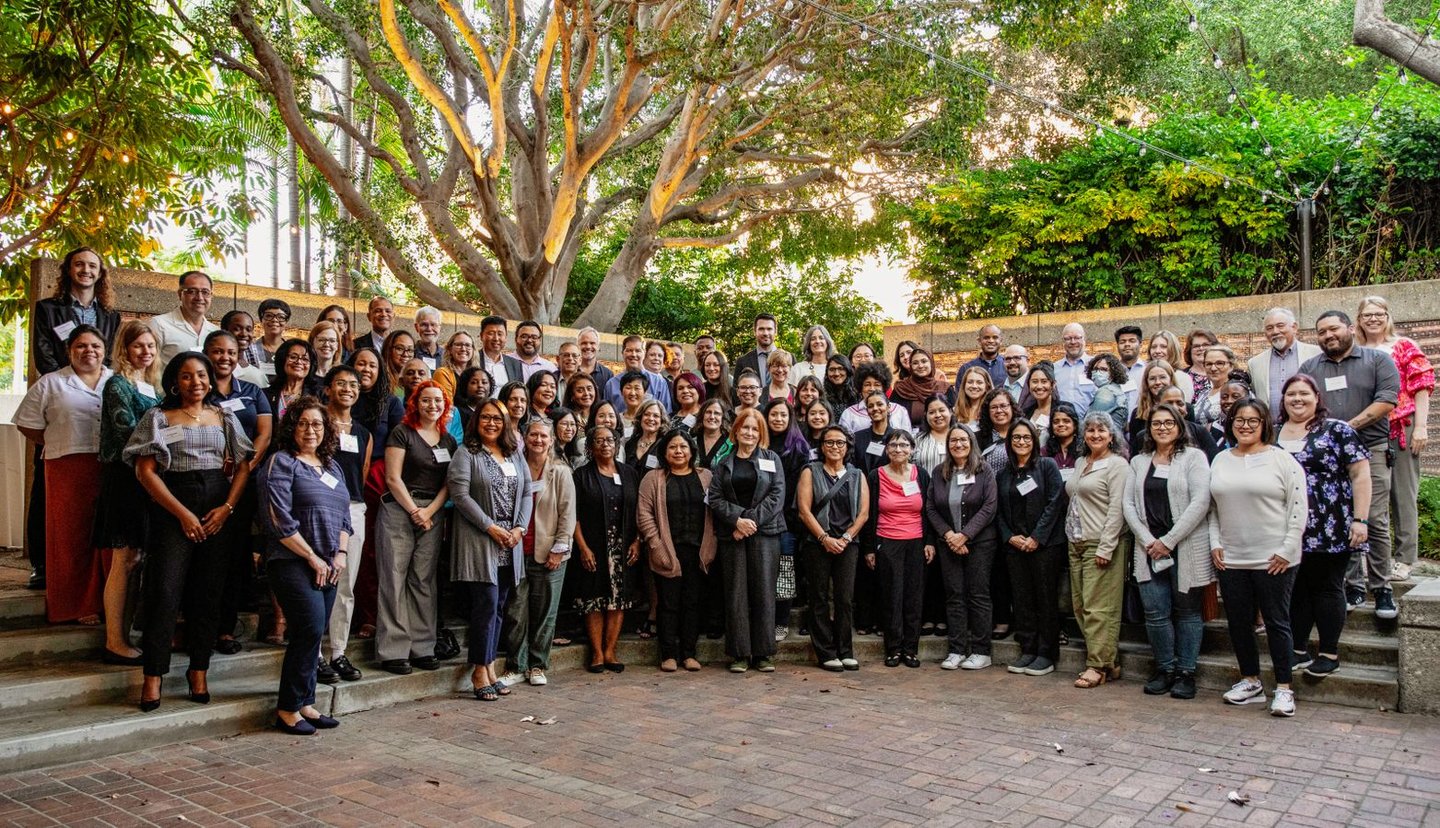
Ending Well Together: DPC reflects on legacy at final conference
By Melissa Simon
July 26, 2023
For the first time since 2019, members of the Diversity Program Consortium (DPC) met in person to celebrate accomplishments and efforts to advance the goals of the consortium over the last decade.
Around 140 people attended the 2023 DPC Annual Grantees Conference from June 26 to 28 at the UCLA Meyer & Renee Luskin Conference Center, while another 47 participated virtually from across the nation.
This year’s conference was titled “Ending Well Together: Moving the Effort of the DPC Forward,” as the grant funding for the DPC that began in 2014 is set to end in June 2024. Attendees had the opportunity to discuss their projects, the sustainability of their work, how to disseminate information and what the DPC’s legacy will be as the consortium looks to the future.
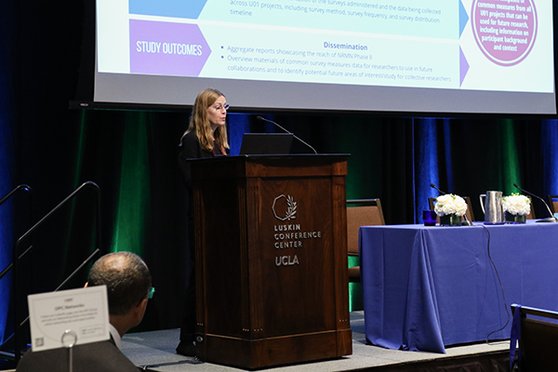
Alison Gammie, PhD, gives opening remarks
Alison Gammie, PhD, the director of the Division of Training, Workforce Development and Diversity (TWD) at the National Institutes of Health (NIH) National Institute of General Medical Sciences (NIGMS) and the DPC program lead, opened Day two with a welcome to attendees during which she expressed gratitude for the work accomplished over the last decade and reflected on what lies ahead.
In her remarks, Gammie said she hoped that the great work done will continue and she encouraged those in attendance to be motivated by the efforts made so far and stay excited to keep moving forward.
“We know how hard this has been and we know how much work you've done and what you've taken on to be change agents at your institutions and in your academic fields,” Gammie said. “We're incredibly grateful and we really respect the work that you've done.”
The DPC’s initiatives have “really hit the mark” in terms of vision, trust, communication, creativity, commitment and adaptability, she said.
“The biomedical research workforce cannot be a place of excellence without diversity and this is the argument we take out into the world as we meet with resistance and people who don't want to change how things are,” Gammie said. “The data shows over and over and over again that diversity matters and it makes us smarter, makes us more innovative, makes us more creative and you can't have excellence in science without it.”
The truly long-lasting impact of the DPC is not just the work accomplished but also getting the word out about these efforts and making sure that it doesn’t end now, Gammie said. Relevance is key for these efforts to persist.
“There are cultural and social forces right now that mean that people are ready to hear your results and to take up the effective interventions that you’ve developed. That’s exciting and another potential key for lasting change,” she said.
Making connections, hearing from colleagues
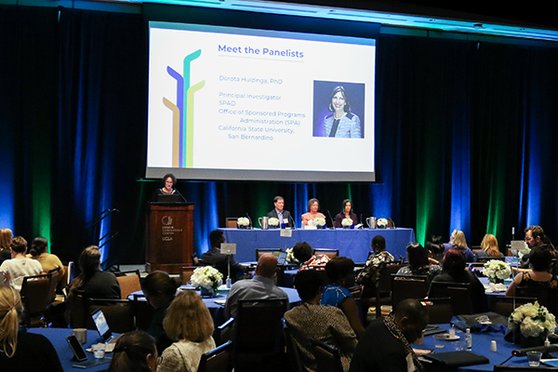
From left to right: Nicole Maccalla, PhD, Thomas Keller, PhD, Doris Rubio, PhD, and Dorota Huizinga, PhD.
All attendees, whether virtual or in-person, had the opportunity to connect with colleagues and discuss collaborations and other projects during unstructured times throughout the three-day conference. These times allowed members of the DPC to reconnect with and learn from one another about their progress and future plans.
Mercedes Rubio, PhD, the chief of the Predoctoral Basic Biomedical and Medical Scientist Training Programs at NIGMS, presented information about upcoming NIGMS funding opportunities and UNITE funding efforts. View Rubio’s presentation.
Conference attendees also heard from colleagues during two panel presentations and four concurrent sessions. In-person participants also had the opportunity to view 42 posters from DPC members highlighting the work they have done.
On Day two, Gabriela Chavira, PhD, from the California State University, Northridge BUILD PODER program, moderated a panel about advancing effective approaches across student, faculty and institutional impacts. Members from BUILD, DPC-DaTA and NRMN sites shared about their successful initiatives and cross-cutting impacts.
Nicole Maccalla, PhD, from the Coordination & Evaluation Center at the University of California, Los Angeles, moderated a second panel focusing on moving the effort of the consortium forward. Speakers highlighted the unique ways that BUILD, NRMN U01 and SPAD awards are creating and sustaining impacts for the biomedical research community.
Read more about the panels at the 2023 DPC conference.
After the panels, participants chose from concurrent sessions on the following topics: deeper insights from DPC awardees on their processes and how they’re working to achieve program goals; strategies for successfully sustaining faculty development activities across three BUILD and SPAD sites, and emerging evidence for their impact; approaches to enhancing the diversity of the biomedical research workforce, barriers faced and strategies used to overcome them from a sustainability perspective; and ways to recruit research participants, retain them in and after the study, and advice for organizing a special issue for dissemination.
Ending Well Together
Mica Estrada, PhD, from the NRMN U01 project at the University of California, San Francisco, moderated the Ending Well Panel at the close of day three. The panelists reflected on the 10-year journey of the DPC, recognizing the programs, research and interventions that emerged, and celebrating the legacy of the consortium.
Speakers included Angela Byars-Winston, PhD, from the University of Wisconsin-Madison (NRMN U01); Lourdes Echegoyen, PhD, from the University of Texas, El Paso (BUILD); Keith Norris, MD, PhD, from the University of California, Los Angeles (CEC); and Christine Pfund, PhD, from the University of Wisconsin-Madison (NRMN Coordination Center).
Pfund said that at the beginning of the grant, much of the focus was placed on numbers for how many students and faculty would be engaged at the BUILD sites or NRMN.
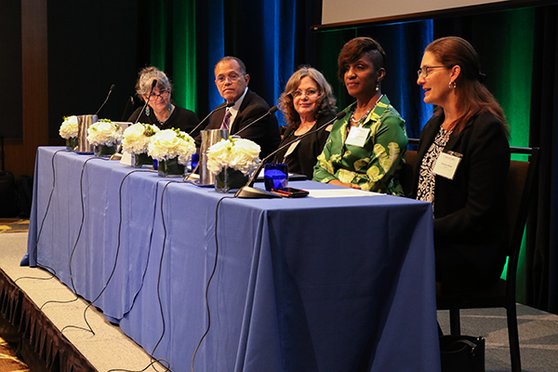
From left to right: Mica Estrada, PhD, Keith Norris, MD, PhD, Lourdes Echegoyen, PhD, Angela Byars-Winston, PhD, and Christine Pfund, PhD.
But over the last decade the focus shifted from looking at the numbers to seeing the people represented by the numbers, and the consortium has impacted tens of thousands of scientists as study participants and through trainings, research experiences and other similar opportunities, she said.
“Most of us in our lifetime won’t get a chance to be part of something that touches that many people, so I think that is something that worked amazingly well and moved us from just counting to really impacting people,” Pfund said.
Echegoyen added that while the data collected over the years is key, what’s perhaps more important is the human aspect, the “who” behind the data. Knowing individuals’ stories and continuing to support them shows the value of diversity, she said.
Her advice to the next generation of researchers and scientists is for the “young people to teach the old folks” because the world is changing and they see the world differently, she said.
“[Young people] need to take leadership to be able to effect that change,” Echegoyen said. “We need to empower the young people to do what they think is best for their generation. Be empowered, challenge us.”
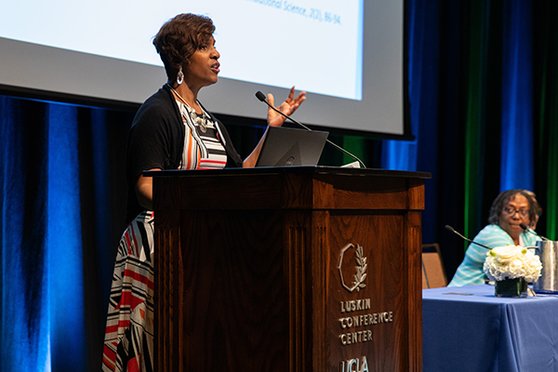
Angela Byars-Winston, PhD
Byars-Winston further encouraged young people to find their “why” or their reason for doing what they do, regardless of the title or position they hold because there is much work to still be done.
“When you get clear about your purpose, it's amazing how it starts to align with opportunity and so I encourage you to spend time reflecting. Don't shortchange the self-reflection to get clear on your ‘w-h-y,’” Byars-Winston said.
Byars-Winston shared some challenges from her own career and said that having support from others helped her stay focused on her “why.”
“Stay with your purpose because it won’t ever fail you; that’s your true north,” she said.
Estrada echoed her colleagues, adding that finding community is key for those in the early part of their careers. She said she couldn’t stress the importance of creating a community and sharing concerns and triumphs with others.
“That’s one of the things that consortiums like this, where you come together across many, many years, [have done]. You have the opportunity to build that community,” Estrada said.
In reflecting on what he learned over the last decade, Norris talked about how the concepts of inclusion and equity are just as important as diversity when it comes to creating change. For those who work with initiatives like the DPC, he highlighted the need to create spaces that respect and value people for who they are.
“Diversity just can't happen if there's no change in the energy around inclusion, respect and valuing people,” Norris said. “They happen together.”
Visit the conference website to view the conference program and other materials, and to read about the moderators, speakers and session leaders who presented during the three-day event. Recordings of all sessions can be requested by emailing info@diversityprogramconsortium.org.
This story is included in the Volume 8, Issue 2 of the DPC Newsletter — “Moving the Efforts of the DPC Forward"
The Diversity Program Consortium Coordination and Evaluation Center at UCLA is supported by Office of the Director of the National Institutes of Health / National Institutes of General Medical Sciences under award number U54GM119024.

Grow Together.